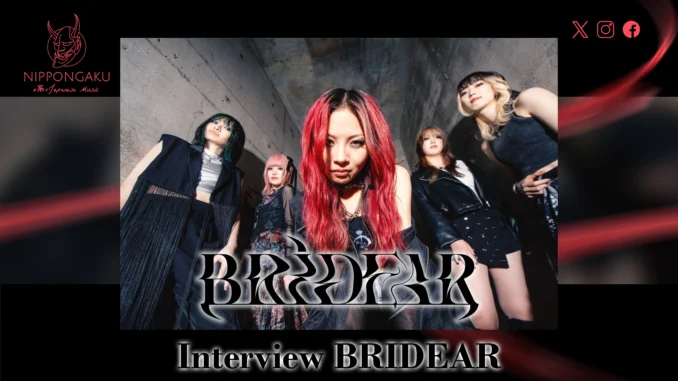
Welcome, BRIDEAR!
First of all, thank you so much for taking the time to answer our questions.
For those discovering BRIDEAR for the first time, could you briefly introduce yourselves?
KIMI: I’m KIMI, vocalist of BRIDEAR. I’m also the leader of the band — you can easily recognize me by my red hair.
AYUMI: I’m AYUMI, guitarist! From the audience’s perspective, I’m the one on the right side of the stage. My hair has a bit of green in it.
MOE: I’m MOE, on guitar too. Nice to meet you!
HARU: Hello! I’m HARU, bassist and in charge of the growls.
I usually wear a ribbon, so feel free to use that as a reference to spot me. (laughs)
Happy to be here!
NATSUMI: Nice to meet you, I’m NATSUMI, drummer of BRIDEAR.
It’s been six years since I joined the band!
I’m constantly working to improve my skills and aim even higher!
What’s the origin behind the band name BRIDEAR?
KIMI: We wanted a name that would instantly make it clear that we’re a female band, and “BRIDE” came up as a suggestion.
But “BRIDE” alone felt a bit too plain, so we took the phrase “Dear Bride”, flipped and combined the words, and ended up creating a new term: “BRIDEAR”.
Many fans see BRIDEAR as one of the leading female bands in metal. How do you feel about that? Was it something you aimed for from the start, or did it happen naturally?
KIMI: I’m really happy to hear that.
When we started the band, we wanted to stand out and become a powerful presence in the metal scene, which is still mostly male-dominated.
I truly feel that today’s BRIDEAR holds its own, both in terms of songwriting and live performances.
AYUMI: We still want many more people to discover BRIDEAR, but I think all of us in the band are very aware of staying true to our role as a representative presence in the scene.
HARU: We’ve always wanted to show that even as women, you can absolutely have a metal band — and also become a gateway for others to start listening to metal.
It makes me genuinely happy to hear that some people feel that way.
NATSUMI: I’m really grateful to hear that, and I have so much appreciation for the original members who built BRIDEAR into what it is today.
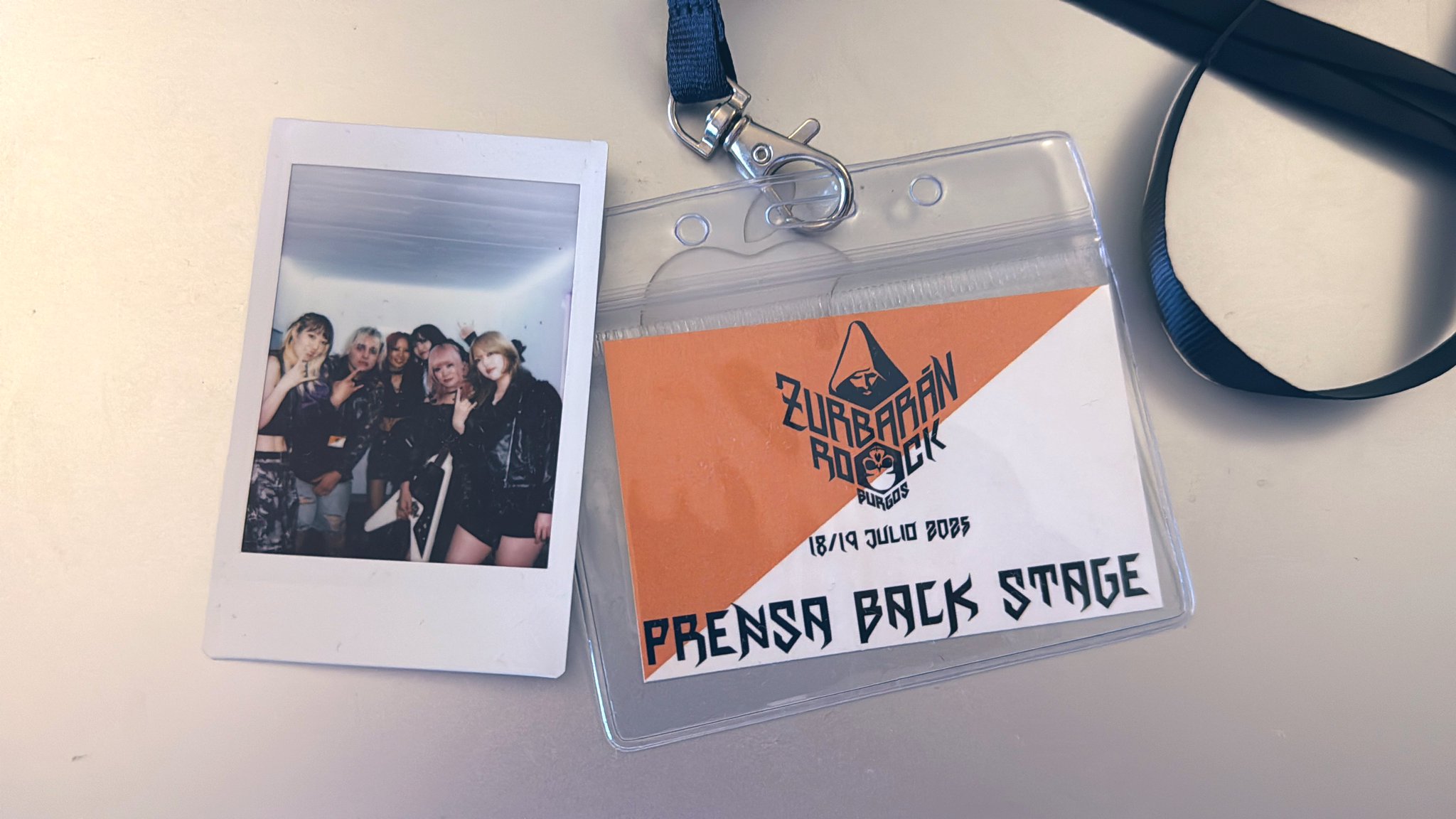
Compared to when you debuted, BRIDEAR’s sound has evolved significantly. How would you describe your current sound?
KIMI: In the early days, our music had both flexibility and rawness, a mix of cuteness and rough edges.
Now I think BRIDEAR has grown into something much more polished, sharp, but with real weight and depth.
YUMI: Each of us comes from different musical backgrounds, and I think the biggest evolution has been our ability to bring all those influences together and try out a variety of styles.
Our album Born Again, released last year, is a direct reflection of that.
MOE: I’d say our sound now is a much more refined form of metal.
What I really focus on is fusing heavy, aggressive metal sounds with catchy melodic lines — the kind you might find in J-pop.
That’s what makes us unique. That’s the BRIDEAR sound.
Lately, I feel like that sound has sharpened even more — it’s becoming something truly one-of-a-kind.
We want to keep evolving without ever being afraid of change.
HARU: Back when we debuted, our sound was all about speed and raw momentum.
Now we’ve added more delicate, expressive touches to our arrangements.
Honestly, the old me might’ve found it too complicated and just run away! (laughs)
NATSUMI: After going through some member changes, our individual strengths and personalities have gradually blended together, and over time, our sound has started to really solidify.
And I believe it will keep on evolving from here.
Where do you draw inspiration for your lyrics? Do they mostly come from personal experiences, or do you try to address more universal themes?
KIMI: I really enjoy thinking deeply about characters and stories when watching movies or anime.
Sometimes I imagine things like, “Maybe this character was actually thinking this…” and I turn that personal interpretation into lyrics.
I also write about social issues, expressing my own perspective through the words.
For songs with a strong live energy, the lyrics are often messages directed to our fans.
So even if they’re not based on direct personal experiences, most of them reflect my own thoughts.
I don’t usually write from the mindset of a completely different personality.
AYUMI: When I write lyrics, I start by creating a “main character” for the song.
I think about their past, what they’ve been through, and then explore their emotional journey through that lens.
The song Determination, for example, is especially story-driven from the very beginning.
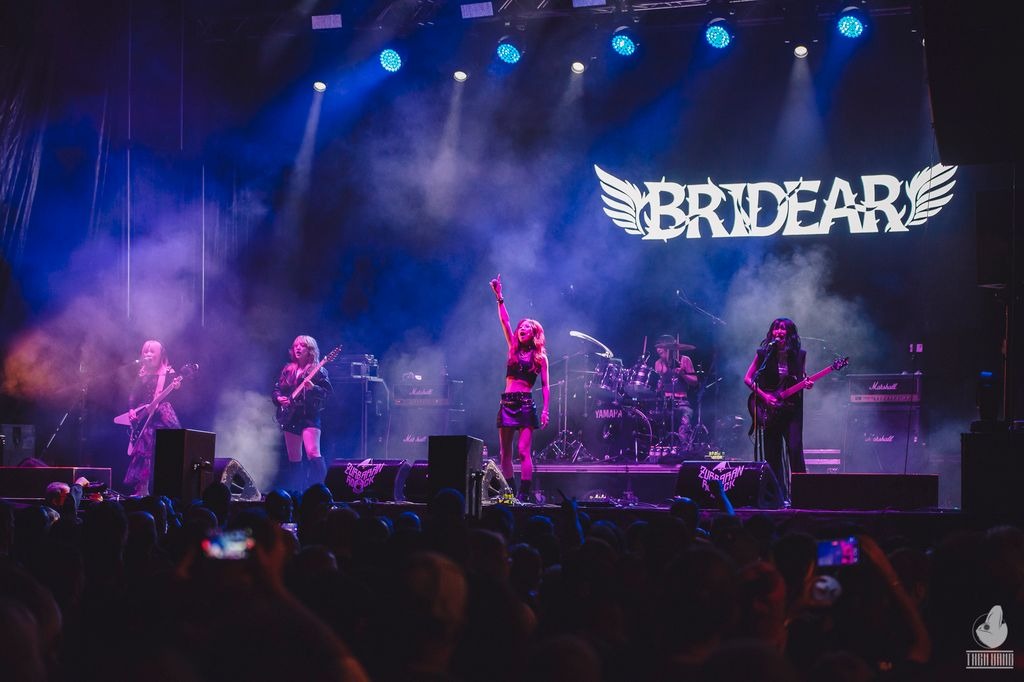
Have you come across any Spanish stories or legends that might inspire a future song?
KIMI: I really like mythology, so there’s a good chance something like that will end up in our lyrics someday.
Spain’s gothic architecture left a very strong impression on me.
AYUMI: I’m not very familiar with Spanish legends or stories, but listening to Spanish music has influenced me a lot.
I think it would be fun to experiment with incorporating flamenco-style guitar into our metal sound.
MOE: Spain has so many myths, legends, and moments in history that carry a sense of strength and pride—it really drew me in.
The story of the medieval knight “El Cid” stood out in particular, with his unwavering sense of conviction.
It really resonated with our own concept of “unshakable strength.”
I think that kind of inspiration could definitely feed into our future songwriting.
HARU: We visited the Burgos Cathedral, and it was absolutely stunning—every corner was full of intricate details.
I’d love to create a song that’s not only strong but also beautiful, with a story behind it that you can feel.
NATSUMI: I also visited the Burgos Cathedral, which is a World Heritage Site.
The craftsmanship in the architecture and sculptures was breathtaking.
Some of the imagery even evoked pain or sorrow, and I thought it could make a powerful theme for a song.
Your songs feature very intricate arrangements. What is your songwriting process like within the band? Who usually takes the lead when starting a new track?
AYUMI: Most of us contribute to songwriting, but the ones who handle the arrangements and really shape the songs into their near-final form are usually MOE and myself.
In metal, the quality of the guitar arrangement is especially important, so we often share demo tracks with the rest of the band and discuss them in depth with the composer to refine everything together.
MOE: First, we agree on the overall direction or concept for a new song. From there, each of us composes independently.
Then we pick the one that best fits the current BRIDEAR sound or the message we want to convey at that moment, and we all work together to polish the arrangement.
I think the variety in BRIDEAR’s music comes from the individuality each of us brings into the songwriting.
Among your current repertoire, is there a song that holds special meaning for you? We’d love to hear why.
KIMI: Personally, I’d say “Scar of Reunion”.
I was really happy to release a straight-up Japanese-style metal track with BRIDEAR — it represents my musical roots very well.
The lyrics are a deeply personal interpretation of one of my favorite games, and honestly, I think I did a pretty good job with them!
As a band, I’d say “Ghoul” really embodies the BRIDEAR spirit. And the flames in the music video? Big win! (Laughs)
AYUMI: Every song from the Born Again album means a lot to me, but the first that comes to mind is “Scar of Reunion”, which I arranged.
It’s the most metal-driven song I’ve worked on, and heavily inspired by Japanese metal.
That track really opened a new creative door for me — I didn’t know I could pull off an arrangement like that.
MOE: For me, it’s “Still Burning”.
It was part of the first album I worked on after joining BRIDEAR.
I wanted to bring in something fresh while still staying true to BRIDEAR’s established sound, and I wrestled with that balance a lot.
But when I heard the final mix, I had this moment of clarity: “This song can reach the world.”
It holds all the growth and challenges I went through, and it’s incredibly dear to me.
HARU: I also choose “Still Burning”.
It’s one of the key songs from the first album we made after MOE joined.
We recorded it in Sweden, which was a huge challenge — different culture, language barriers… a lot of uncertainty.
But we got through it together, and that made me feel just how powerful being in a band really is.
It reminded me how special BRIDEAR is.
NATSUMI: I’d say “ROAD”.
Out of the two songs I’ve composed for BRIDEAR so far, “ROAD” was one of my first, and I feel really attached to it.
We often play it during encores, and the fans always get super hyped, which makes me love it even more.
This was your first-ever show in Spain. How did you feel after performing at ZURBARÁN ROCK?
KIMI: I was truly moved by how warmly we were welcomed in a country we were visiting for the first time.
I could really feel that everything we’ve done so far had somehow reached all the way to Spain. That made me genuinely happy.
AYUMI: I thought, “I’m so glad I chose this path and that music has brought me all the way to Spain.”
It felt incredibly rewarding to be here.
MOE: This performance gave me a crystal-clear vision: “Yes, we can keep expanding across the world.”
The impact it left on me was huge.
Even though it was our first-ever show in Spain, so many people came to see us. That view from the stage is something I’ll never forget.
Realizing that our music can transcend languages and borders gave us a new level of confidence moving forward.
HARU: All I could think was: “We absolutely HAVE to come back to Spain!”
There were so many fans who genuinely love metal — you could feel this raw, pure energy in the air.
Everyone was so kind and passionate… I truly felt Spain is a wonderful country.
NATSUMI: In one word: amazing.
I’ve imagined that moment so many times — playing on a big stage in front of a huge audience. It was like seeing my dream come to life.
It was our first time in the country, and many in the crowd didn’t even know us yet… so to feel that level of excitement and support was absolutely overwhelming in the best way.
What kind of impression did Spain leave on you? How was the food? Do you have any memorable stories from the trip?
KIMI: What stayed with me the most was how kind everyone was — from the audience, to the staff, to people we met in the streets.
And the food? Everything was delicious!
A memory I treasure is from a kebab shop across from our hotel. They were so kind to us that I gave them one of our band T-shirts as a thank-you gift — and they later posted a picture wearing it on Instagram! That made me so happy. I definitely want to go back.
AYUMI: Everywhere we went, people were welcoming and friendly.
The food was amazing — I wish I had tried even more kinds of tapas!
Spanish is tough (laughs), but I did master two important phrases: “café con leche con hielo” and “vino tinto/blanco”!
MOE: I was really impressed by how kind and warm-hearted everyone in Spain was. It was easy to connect with people.
During our day off, I visited the Burgos Cathedral and was completely captivated by its grandeur and delicate architectural beauty.
I already loved Spanish food before, but tasting it in its homeland made me fall for it even more.
Spain has definitely become one of my favorite countries.
HARU: At ZURBARÁN ROCK, I had this tapa — it was like a small baguette topped with something like potato salad. It was so good!
I found similar things at other places too, each with its own flavor.
My favorite was the one that tasted like potato salad.
Does anyone know what it’s called? I’d love to try making it at home in Japan!
NATSUMI: I was surprised by how many people came up to talk to us — everyone was so friendly!
Also, I was shocked by how long it stays bright outside! In Japan, it gets dark around 6 PM, but in Spain it was still sunny at 8 PM!
I kept thinking, “When does night actually start here?” (laughs).
And the paella — I always thought it was supposed to be dry and fluffy, but the real one here was so juicy. That was a big discovery!
And I’ll never forget the kebab place that treated us so kindly. Even though it must have been closing time, they waited for us after our show — around 4 AM!
I’m so grateful for how warmly they welcomed us.
Did you feel any difference between the way Japanese fans and European or Spanish fans react at concerts?
KIMI: I was amazed by how passionate the Spanish audience was.
You could tell everyone was giving their all to enjoy the music, and when they liked something, they weren’t shy about saying it.
So many people came to talk to us in person, and we also got tons of messages online.
As an artist, that kind of love is the greatest reward.
AYUMI: Everyone was watching us with such warm smiles — it really showed how much they were enjoying it.
Even if they didn’t know our songs, they still tried to sing along or join in with the chants.
That meant so much to me.
MOE: Spanish fans are incredibly loud and expressive — their cheers were like being in a football stadium!
At one point, the crowd broke into a chant that felt like a soccer anthem, and I thought, “This is SO Spain!”
I got so emotional I nearly cried (laughs).
That kind of energy — where we’re creating the live together — is just magical.
HARU: During the MC at ZURBARÁN ROCK, everyone started singing along with us!
The unity and warmth of the Spanish fans moved me deeply. I was so happy and overwhelmed.
NATSUMI: Even though it was our first time in Spain and many people probably didn’t know who we were,
they stayed with us until the very end and expressed their joy and excitement so openly.
That kind of reaction isn’t something you get everywhere.
Thank you so much.
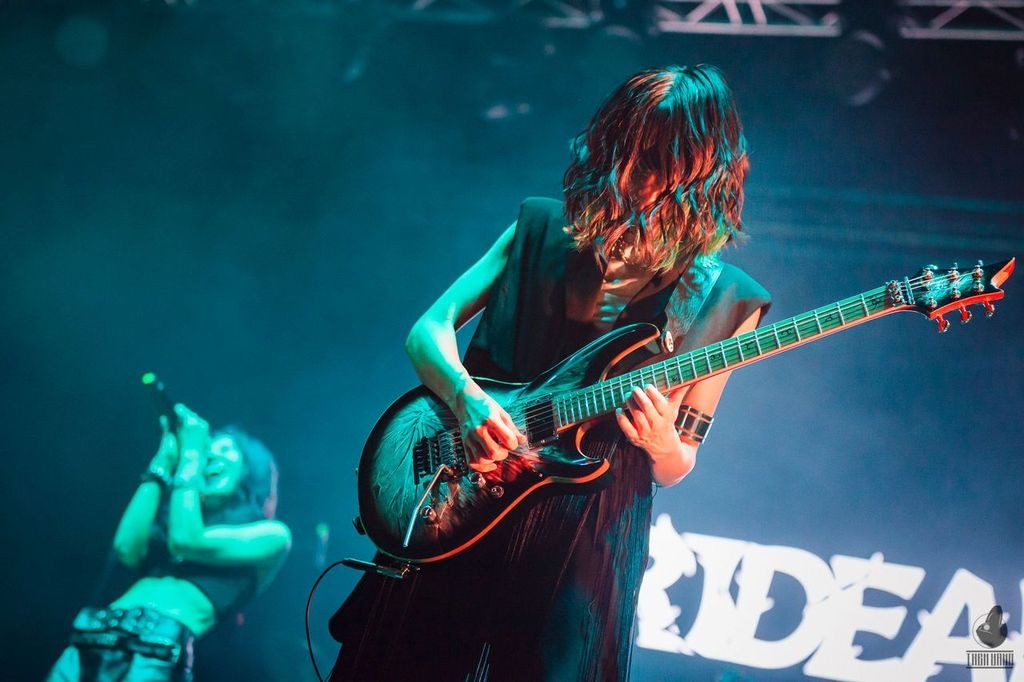
What’s been the biggest challenge or learning experience during your international tours?
KIMI: For me, the toughest challenge is still doing long tours.
Traveling constantly, adapting to new places every day, and still giving it your all —
every tour pushes my physical and mental limits.
It always feels like I’m asking myself, “How far can I go?”
AYUMI: You never know what might happen when playing abroad.
That’s why I always prepare multiple gear setups just in case.
This time, we couldn’t do a proper soundcheck due to time constraints,
but we still pulled off a great show — and that confirmed to me how vital those preparations really are.
MOE: Playing in countries with different cultures and values really helps me broaden my perspective.
And knowing that people in other parts of the world are listening to our music…
It’s so encouraging, and it reminds me why I love doing this.
HARU: Gear, the environment, the language — those are always big hurdles.
We can’t bring everything from Japan, so I’m constantly looking for light, compact gear that works in any situation.
And I want to keep improving my communication skills when talking about sound abroad.
If there’s one thing I’ve gained from overseas touring, it’s resilience and adaptability.
Whatever happens, we find a way.
NATSUMI: When you can’t rely fully on language to connect,
the real test becomes: Can I still give my best on stage?
And more importantly: Can I truly enjoy myself despite that?
That’s what international lives really put to the test.
Do you have any special routines or habits before going on stage overseas?
KIMI: Whether we’re in Japan or abroad, I always stick to the same prep.
I take throat medicine and some manuka honey before going on stage,
and I always have water mixed with honey as my stage drink.
It’s part of my must-have routine!
AYUMI: Actually, this time things were so rushed before the show
that we didn’t even get to do our usual pre-show team huddle…
MOE: I don’t do anything different than I would in Japan.
I just focus on one thing: having fun!
HARU: I try to keep my routine the same as in Japan.
That means making sure all my floor gear is set properly, taking care of my throat,
and of course, our pre-show team huddle —
that last moment together always gets me fired up!
NATSUMI: No matter where we are, there are two things I always do before a live show:
gathering with the members to put our hands together and fire each other up,
and taking care of my legs and feet.
Since I use double bass pedals a lot, that kind of physical prep is super important for me.
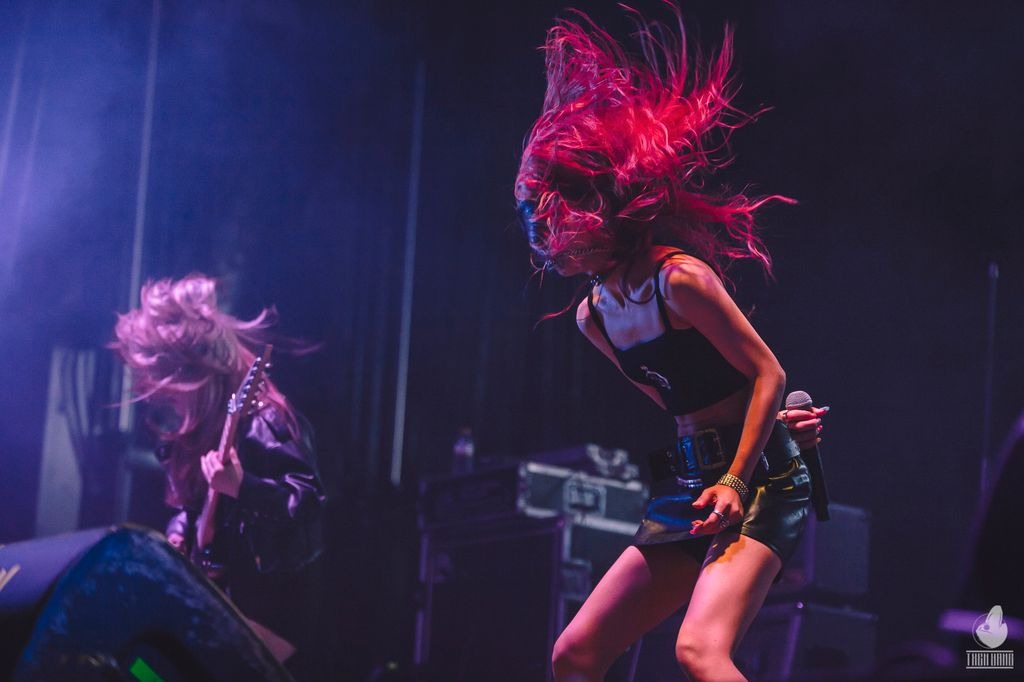
BRIDEAR’s music carries messages of strength, determination, and fighting spirit. Do you feel those messages resonate even more deeply when performing overseas?
KIMI: Absolutely.
During a previous European tour, we performed Road — a song we wrote during the pandemic about our connection with fans and our determination to keep going.
I saw someone in the audience place their hand over their heart and sing along.
That moment made me realize: the message really reached them.
Since then, Road has become even more meaningful to me.
MOE: The more we perform a song, the deeper it grows inside us.
And every time we stand on stage, the audience’s feelings and energy blend with the music, making each song even more special.
That shared experience is what gives songs new life.
HARU: I felt this especially during the pandemic.
With live venues closed around the world and no concerts happening, we wrote BRAVE NEW WORLD REVISITED as a way to say:
“We will get through this.”
We became the first Japanese band to tour Europe after COVID, and although it wasn’t easy,
the fact that we could once again play for people and share those moments — it meant the world.
That atmosphere, those emotions… I’ll never forget it.
In those moments, there were no borders at all.
NATSUMI: I’ve always believed that music has no borders.
And when we perform and see people who didn’t know us jumping in, enjoying the moment,
it proves to me again and again that this feeling is something we all share, no matter where we are.
What would you like European fans to know about BRIDEAR?
KIMI: Honestly, we feel like our European fans have helped us grow as a band.
They’ve given us so much strength, and I really hope that love reaches you, too.
AYUMI: On stage we move intensely and with lots of attitude —
but the truth is, we all get along really well!
There are lots of fun videos out there, so be sure to check them out!
MOE: BRIDEAR is a metal band from Japan with its eyes set on the world.
Our music is always full of passion, and when we’re on stage, we give everything to share that with you.
Even if you haven’t heard of us before, we invite you to come to a show at least once.
NATSUMI: We’re a band that really values melody.
We often get labeled as a “girls metal band”,
but we aim to break that stereotype —
we bring strength, seriousness, and a solid musical presence.
Who are your musical roots or biggest influences?
And if you had the chance to collaborate with another artist — from Japan or abroad — who would you choose?
KIMI: My musical roots are in bands like SEX MACHINEGUNS, Janne Da Arc, METALLICA, and IN FLAMES.
The very first thing I got into was thrash metal, and it’s still my favorite to this day.
In terms of collabs — I’d love to work with Coldrain in Japan, and IN FLAMES overseas!
AYUMI: I’ve been really influenced by British bands like Muse, Oasis, and Radiohead.
I especially admire Muse as a guitarist.
They’ve also released some heavier, metal-like tracks, so I’d love to share a festival stage with them someday.
MOE: My roots are in 80s and 90s metal.
MEGADETH had a massive impact on me.
I haven’t pinpointed any specific artist yet, but I think collaborating with someone from a completely different genre could lead to something unique and exciting.
HARU: I grew up listening only to classical music.
The band that opened my eyes was Janne Da Arc from Japan.
Their sound and melodies were a total shock — and from there I dove into visual kei and eventually fell in love with metal.
I’d love to collaborate with an orchestra!
The idea of fusing BRIDEAR’s sound with full symphonic arrangements sounds incredibly epic.
NATSUMI: The band that influenced me most is UVERworld.
Their passion drew me into the world of music.
I love how honest and direct they are in both life and music.
Someday, I’d love to collaborate with them — and be able to thank them from the bottom of my heart.
What’s next for BRIDEAR? Any new releases on the way? Are you planning more overseas shows?
KIMI: We’re currently working on new songs!
And yes — we’re thinking about doing more shows abroad.
Hopefully we’ll be able to go on tour again next year!
MOE: From now on, we’re planning to be even more active on stage.
New releases are definitely on the horizon — and yes, more overseas shows too!
NATSUMI: Yes! We’re definitely thinking about playing abroad again.
And we hope to put out more new music soon as well.
If you had to describe BRIDEAR’s music in just one Japanese word, what would it be? And please tell us why.
KIMI: “ヘッドバンガーズ!!” (Headbangers!!)
We simply want to grow as a heavy metal band.
AYUMI: I’d pick one kanji: 「刺」 (shi).
It’s like a sharp sound that pierces and stimulates through music.
MOE: For me, it’s 「貫く」 (tsuranuku), meaning “to stay true” or “to persevere.”
BRIDEAR has always stuck to our music and beliefs no matter what. I think that attitude shows in our sound and live shows. And I hope it can push someone to move forward or start something new.
HARU: One word… tough, but I’d say 「衝撃!」 (impact!)
The delicacy and craft in our melodies and arrangements, plus the power and weight of our sound — these are our weapons. We want to make music that leaves a strong impression.
NATSUMI: I’d express it with the kanji 「築き」 (kizuki), meaning “building” or “foundation.”
It represents all the experiences, strength, and memories we’ve built together that have shaped who we are now.
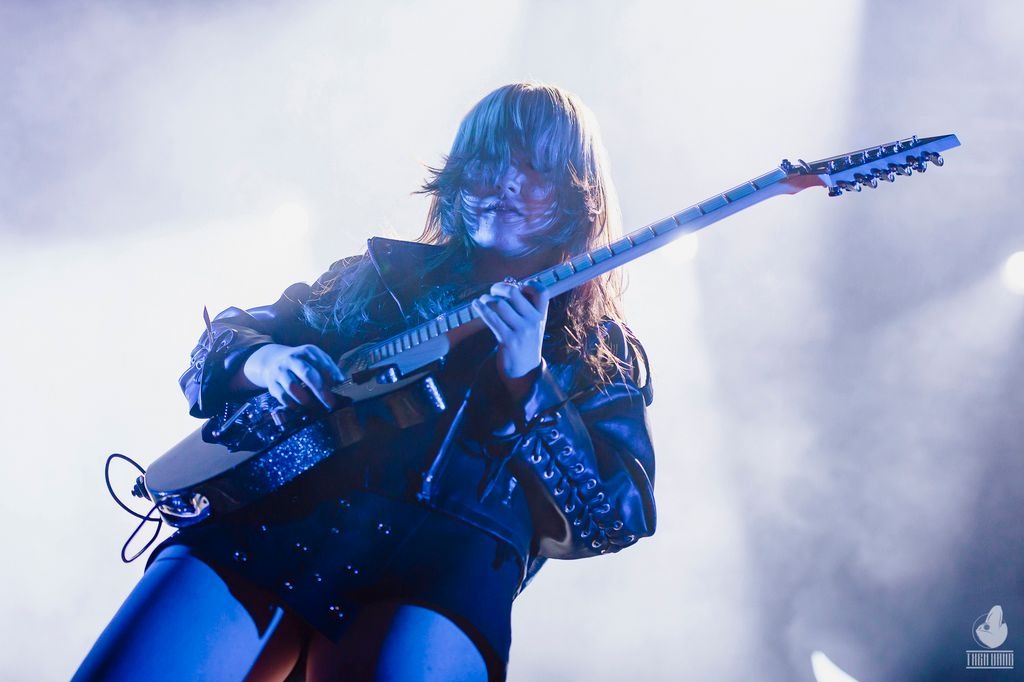
We understand MOE will be taking a break from the stage for a while. Please take good care of yourself and don’t push too hard.
Do you have plans this year to try new things or challenge yourself with things you haven’t been able to do before?
MOE: During this break, I’ll be actively working on music production, and when I come back, I want people to feel like, “Wow, they’ve evolved!” I’m going to do everything I can to make that happen.
Finally, could you leave a message for NIPPONGAKU’s readers?
KIMI: I want everyone to listen to a lot of BRIDEAR’s music! And see you at the shows!
AYUMI: Thanks for reading! I’m really happy that everyone’s interested in Japanese music, especially Japanese metal. We’ll keep exciting you, so look forward to it! See you at the shows!
MOE: Thank you so much for reading.
We’re still in the midst of challenges.
It would mean a lot to have you walk with us as we fly toward bigger stages.
HARU: Thanks so much to everyone who listens to BRIDEAR!
The show in Spain gave us fresh inspiration and great energy.
We want to keep delivering a powerful and beautiful band sound that only BRIDEAR can do.
Come to our shows!
And thanks to NIPPONGAKU for spreading Japanese music worldwide.
NATSUMI: Thanks for reading our message!
We’d be really happy if this article makes you a bit curious about us.
Performing at ZURBARÁN ROCK and being so warmly welcomed was amazing, a night we’ll never forget.
We’d love to perform again in Spain!
📸: Txen Yang
